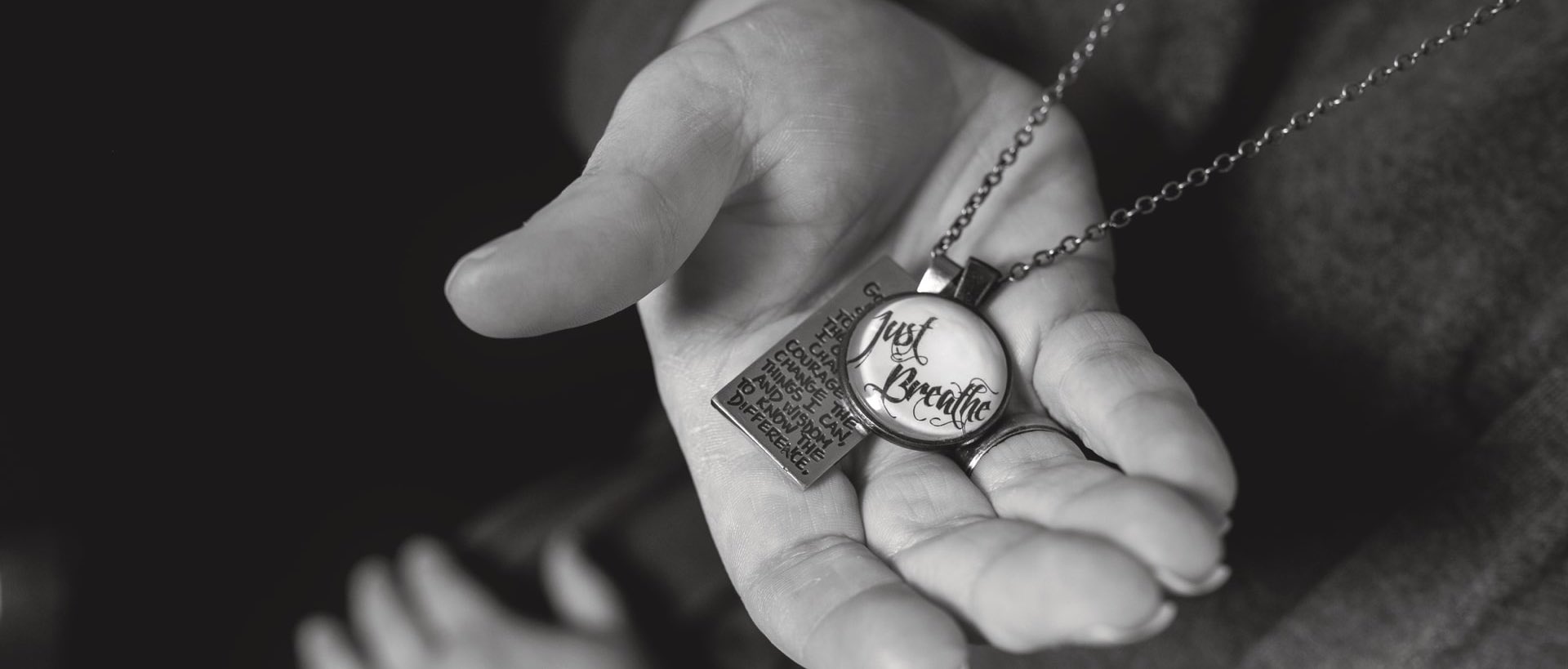It was 3 a.m., in the early months of COVID.
The Rev. Shannon Marie Berry sat on her stoop. Fremont, North Carolina, with a population of about 1,200, was quiet. Berry was alone and fixated on the bell tower of Fremont United Methodist Church across the street. She’d been hardly sleeping. Her Apple Watch was collecting alarming heart rate data. And she was staring at the church she was responsible for leading, worn out and defeated.
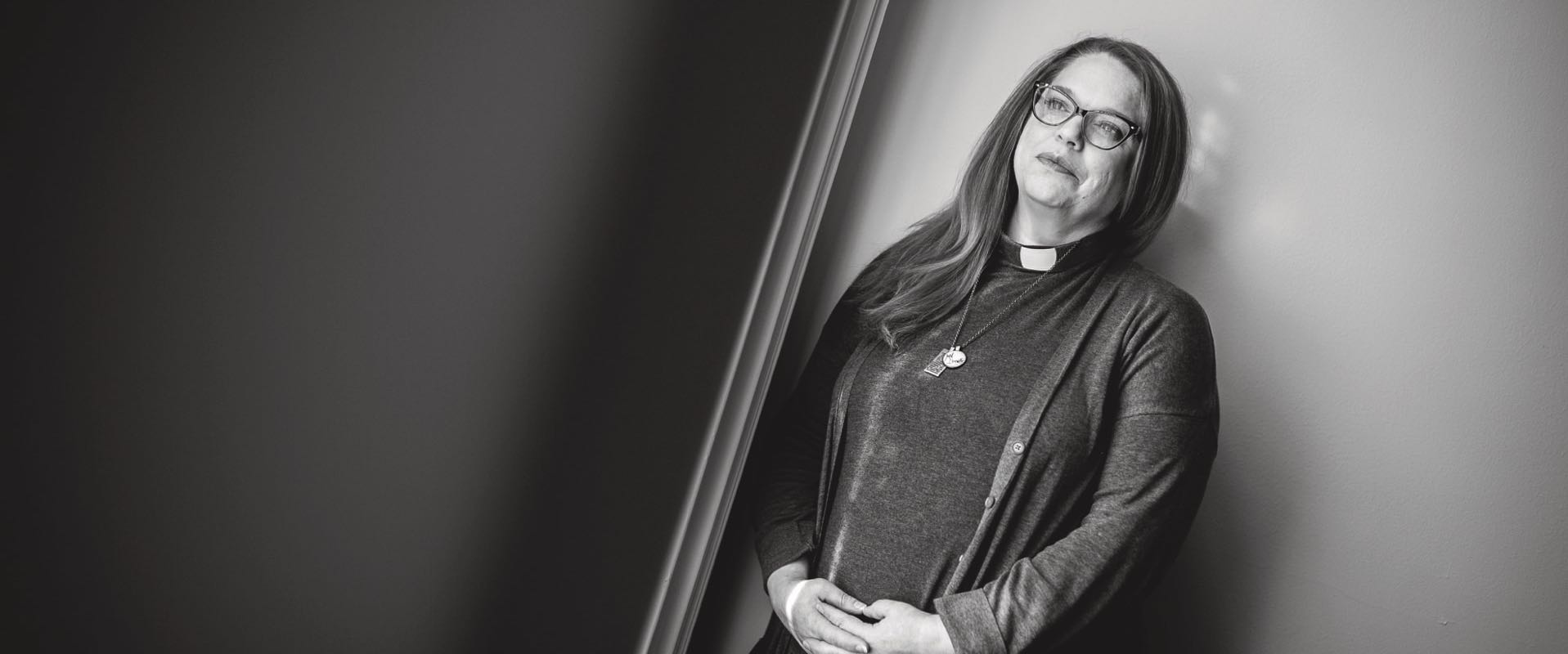
“When it crosses my mind to jump off the bell tower, I can’t help anybody else be grounded,” Berry admitted, acknowledging the despair she felt. “I’d just as soon they come jump with me.”
“When it crosses my mind to jump off the bell tower, I can’t help anybody else be grounded.”
- BERRY
Two and a half years later, a changed Berry sits in her church office much stronger. She feels deeply – she cries, she laughs, she shares videos of her college-aged son’s recent guitar recital. Chill, ambient music seeps from speakers, and every now and again she silently grounds herself: I feel my feet firm on the floor. I feel how the breath that leaves my body is warmer than it was when it came in.
Today this Methodist pastor has strong, practical solutions to the overwhelming stresses of her calling. She has the Duke Clergy Health Initiative to thank for that newfound peace. The Initiative, an interdisciplinary collaboration between Duke Divinity School and the Duke Global Health Institute, studies the myriad health problems pastors face, and it develops and shares practices to help them navigate issues with their own mental health and stress.
“Oftentimes when I am in crisis, I can reach out to a friend who’s not in crisis and they can kind of help talk me down,” Berry says. “When all of your friends are in crisis, that’s when we need [something] like the Clergy Health Initiative to step in.”
“They’re frontline mental health providers.”
- EAGLE
Since 2007 – and with direct support from the Duke Endowment – the Clergy Health Initiative has gathered qualitative and quantitative data about mental and physical health issues specific to North Carolina’s United Methodist clergy. It also develops mental health intervention strategies, which it disseminates through the clergy. As Berry puts it, this is mental health care without a copay. How could she turn that down?
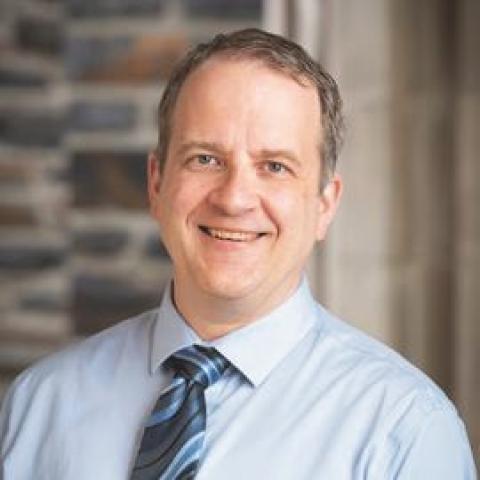
Whether living through a pandemic or more routine times, it isn’t easy being clergy, and it’s only getting tougher as church attendance plummets, volunteers become harder to find and America becomes more polarized. This polarization has expressed itself within the United Methodist Church’s ongoing split over same-sex marriage and the ordination of LGBTQ clergy. There are pay discrepancies between large and small churches and along racial lines, sociologist and Clergy Health Initiative co-lead David Eagle (M.T.S.’09, A.M.’11, Ph.D.’15) explains. As church attendance in the U.S. falls, he adds, pastoral salaries do as well.
Members of the clergy experience above-average rates of burnout, diabetes, hypertension and depression, as the Initiative’s research shows. They’re called in when there are tragic deaths or when couples need marriage counseling. They gladly take on burdens, but feel them deeply, too.
“They’re frontline mental health providers,” Eagle says. As one pastor told an early Clergy Health Initiative focus group, “If I have a hundred people in the pews, I have a hundred different job descriptions for me.”
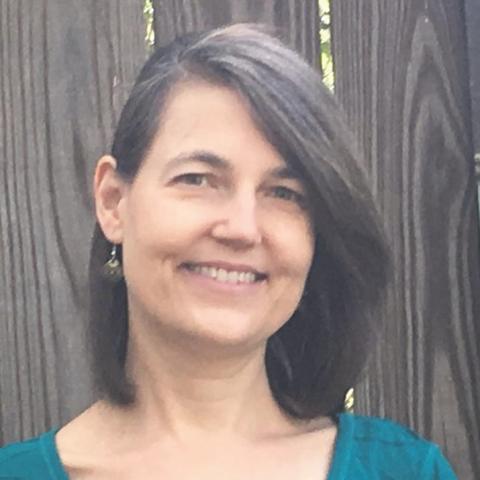
Yet they don’t want those congregations shrinking either, says Eagle, a former pastor himself. “Pastors are feeling that – the decline of the church and the death of communities that they love,” he says.
The Clergy Health Initiative aims to be as multifaceted as the problems it studies and addresses. Positive, lasting change is the goal, says initiative co-lead Rae Jean Proeschold-Bell '93. To get there will take a robust, stable program. It also takes treating pastors as what they are: people.
“Nobody asks clergy about themselves,” she says.
“Nobody asks clergy about themselves.”
- PROESCHOLD-BELL '93
The Rev. Jason Villegas M.Div.’13 faced his first crisis in 2013, three months into his first appointment.
A prominent officer in his church was a “relentless bully,” Villegas recalls. “What have I gotten myself into?” he asked himself. “How am I going to get over this thing?”
Five rocky years later, Villegas looked around and realized the divinity school classmates he’d looked up to as the best minds of his generation, as the bishops and theologians of the future, had already burned out and left the church.
Villegas sits with wife Elizabeth – who is also a pastor – in the humble fellowship hall of the Murfreesboro, North Carolina, United Methodist Church, where Villegas is pastor. He has an open, breezy manner and can talk about hard times without getting bogged down in them. Five years ago, thanks to a laundry list of work-related stressors, he was a very different person.
“Jason ended up in a deep, deep depression, and not the fun, exuberant person that I know and love,” Elizabeth Villegas says.
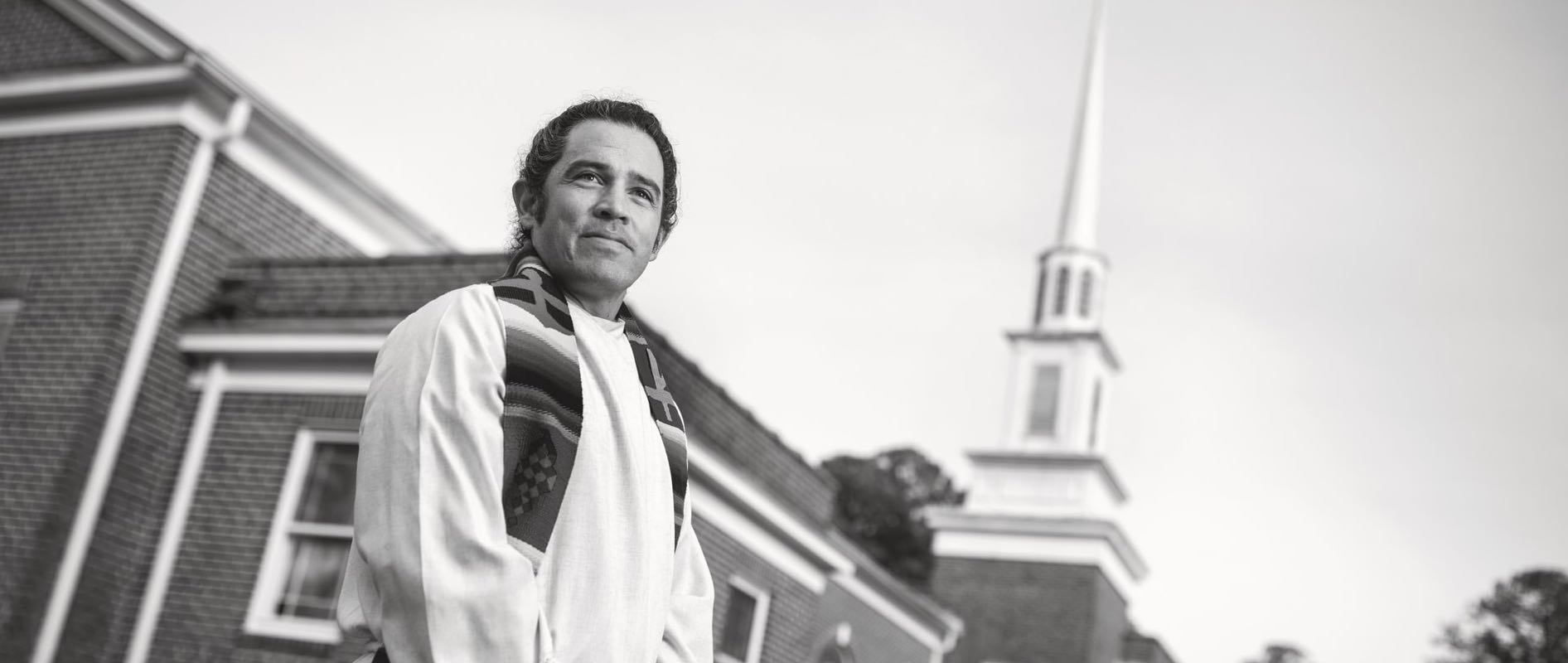
Villegas had been hearing about the Clergy Health Initiative since his own time at Duke. In 2018, he attended Duke Divinity’s annual Convocation on the Rural Church and read the book “Faithful and Fractured: Responding to the Clergy Health Crisis,” which Proeschold-Bell co-wrote. In 2019, he connected with Proeschold-Bell, which led to his involvement in the Selah Stress Management trial in 2020.
While Selah, a study that shared and evaluated three stress-management practices for clergy, was only one element in one of the many studies and interventions the Clergy Health Initiative has undertaken in its 15 years, it has changed Berry’s and Jason Villegas’ lives.
“When I arrived [at Fremont United Methodist Church] in 2018, this group of people had experienced what is still an unsolved murder,” Berry says. Two weeks before her move, Fremont’s former mayor – a member of the congregation – was shot. Then came other deaths. Then came COVID. If there is a normal, Berry never experienced it. She spiraled.
“[Learning mindfulness-based stress reduction] coincided with some other pieces of my road back to myself, back to my family, back to Elizabeth.”
- Villegas
“When my mind is super messy and so messy that I can’t identify who I am and my own self, when I’m in that chaotic state, I can’t do healthy risk assessment,” she says.
Through Selah, she and Villegas learned mindfulness-based stress reduction. It works because it’s practical, because it can be done anywhere and even during a busy schedule. Berry can be talking to someone, and that person will have no idea that she is grounding herself through awareness of breath, for instance, or by acknowledging her senses one by one.
“We had pastors wear ECG devices for 48 hours before starting [Selah] and then three months later,” says Proeschold-Bell. “We collected their heart rate variability. Almost no one has studied heart rate variability with mindfulness-based stress reduction.”
The data indicated improvements in heart rate variability – the heart’s ability to relax following a stressor – which are related to reduced risk of stroke or cardiac events, she continues. About 400 clergy participated in the stress-reduction program, which included, but was not exclusively focused on, mindfulness.
For Villegas, mindfulness takes the form of regular meditation. He is a weightlifter and long-distance runner, and Elizabeth remembers that fear used to drive his workouts: fear of death, fear of health problems. Now running is one of the forms of meditation he practices.
“[Learning mindfulness-based stress reduction] coincided with some other pieces of my road back to myself, back to my family, back to Elizabeth,” Villegas says.
Though today’s Villegas is happier, the couple’s life remains rich with stressors. Elizabeth is pastor of six small congregations in neighboring Gates County. They have three young children. Villegas integrated Murfreesboro United Methodist Church, which had been predominantly white, and made it an English/Spanish bilingual congregation, which caused some congregants to leave. His stress isn’t gone – it’s just no longer in charge.
“Over a hundred years ago [Ernest Shackleton] took an expedition to the South Pole,” Jason offers, explaining his new relationship with stress through metaphor. “I might hit something, like Shackleton’s ship ended up sinking, but he pretty much got his people out of there alive. That’s kind of how I feel.”
Berry had a rough introduction to Fremont United Methodist Church, peaking with the pervasive darkness of the early months of COVID. Now she is in a sustainable state as well.
“I say this to mamas all the time: If you don’t take care of yourself, there’s going to be nothing for you to give to anybody else. I was finally living into the knowledge that I, too, was worthy to give this gift to myself,” Berry says. “Then I started breathing again, because I had been holding my breath for a long time.”
